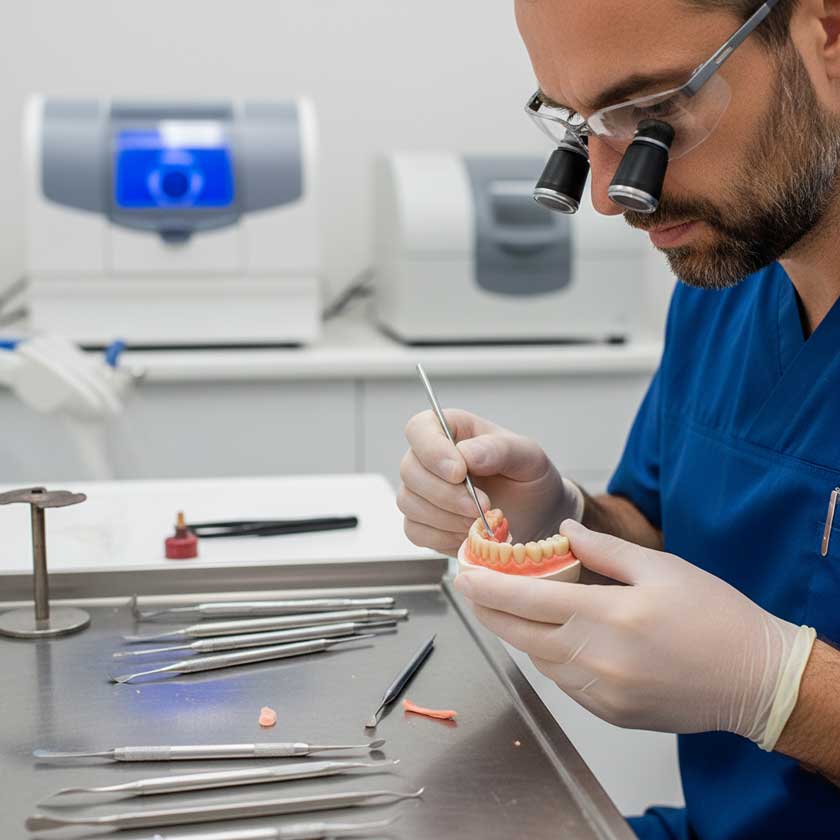Getting a tooth pulled marks a significant step toward better oral health, especially when you're on the path to receiving comfortable, natural-looking dentures. At New Smile Dentures, we've guided thousands of patients through this journey over our 60+ years serving the Treasure Valley. Today, I'm sharing the comprehensive dietary guidance that's helped our patients heal faster and transition seamlessly to their new smiles.

Why your post-extraction diet matters more than you think?
After helping patients for over a decade at our Caldwell and Boise clinics, I’ve seen the dramatic difference proper nutrition makes in recovery time. The right foods can cut healing time by weeks and ensure your mouth is perfectly prepared for your new dentures. The wrong foods? They can lead to painful complications like dry socket, infections, and delayed healing that pushes back your denture timeline.
For the best results and to ensure proper healing after an extraction, it’s important to consult a dental professional for personalized dietary guidance and care recommendations.
Ready to start your journey to a confident smile? Schedule your free consultation or call (208) 454-0311 today.
The first 24 hours: Critical healing time
Right after your extraction, your mouth begins an incredible healing process. Blood clot formation is your body’s natural bandage, protecting the extraction site and jump-starting tissue regeneration. This clot also shields the bone and nerves, ensuring a smoother recovery. During these first crucial hours, it is essential to protect the surgical site and the surrounding gum tissue by avoiding foods that could cause irritation or disrupt healing. What you eat during these first crucial hours can make or break your recovery.
Immediate post-extraction foods (First 4-6 hours).
During this initial phase, only soft foods and liquids should be consumed to protect the healing site. For the first 24 to 48 hours post-extraction, it’s essential to follow a liquid-based diet before gradually introducing soft foods. Here are the best foods to eat during this period:
- Protein shakes (avoid using straws – the suction can dislodge the blood clot)
- Smooth yogurt without fruit chunks
- Cold applesauce
- Ice cream or pudding (the cold helps reduce swelling)
- Bone broth (cooled to room temperature)
- Pudding or custard (a smooth treat that requires no chewing and is suitable post-extraction)
- Liquid soups (such as tomato or chicken broth)
- Protein powder blended into smoothies or shakes
We recommend eating only soft foods and liquids during the initial recovery period to ensure comfort, promote healing, and avoid complications like dislodging the blood clot.
⚠️ Critical Warning: NO straws, NO hot beverages, NO carbonated drinks. These can disturb the precious blood clot protecting your extraction site. Avoid using a straw for at least a week after a tooth extraction to prevent dislodging the clot.
Days 2-3: Expanding your options
As the initial tenderness subsides, it is important to eat soft foods that require minimal chewing and are easy to consume, as this helps protect the healing site and supports a smooth recovery. You can graduate to soft, nutrient-rich foods that support healing:
- Mashed potatoes, scrambled eggs, and yogurt are excellent choices for consuming nutrients without irritating the extraction site.
- Foods like sweet potatoes are ideal because they require no significant chewing, making them gentle on healing tissues.
- Oatmeal can be topped with pureed fruit for added flavor and nutrition, or enjoyed as a snack option that is easy on the mouth.
Protein powerhouses for recovery
- Scrambled eggs (soft and packed with healing proteins, gentle on post-extraction soreness)
- Cottage cheese
- Yogurt (an excellent source of protein and probiotics, both of which are beneficial for healing)
- Smooth hummus
- Finely shredded chicken or tuna mixed with mayonnaise
- Silken tofu (excellent for vegetarians)
Healing carbohydrates
- Mashed potatoes (add butter or sour cream for calories, comforting and easy to consume)
- Cream of wheat or oatmeal (cooled slightly)
- Soft pasta in butter or light cream sauce
- Rice pudding
Vitamin-rich options
- Mashed avocado (healthy fats aid healing)
- Pureed soups (butternut squash, tomato, pea soup)
- Smoothies with spinach or kale (drink from a cup, not a straw, as smoothies provide a nutrient-rich meal without the need for chewing)
- Baby food vegetables (seriously – they're perfectly pureed!)
💡 Pro Tip from Our Denture Lab: Patients who maintain protein intake above 60 grams daily typically heal 30% faster and have better outcomes with their immediate dentures.
Week 1: Building toward normal
The general timeline for transitioning from soft foods to more solid foods after a tooth extraction typically begins around day 4-7, depending on your individual recovery process and the condition of your healing site. By this stage, most patients can start to introduce slightly more textured foods, gradually moving toward solid foods as healing progresses. Returning to your regular diet should be guided by your dentist’s advice, ensuring the healing site is sufficiently recovered to prevent complications. This is especially important if you’re preparing for immediate dentures – maintaining good nutrition ensures optimal healing for the best denture fit.
Soft but satisfying options
Here are some of the best foods to eat during this stage of recovery:
- Soft fish like salmon or tilapia (flakes easily)
- Ground meat in gravy or sauce
- Soft-cooked vegetables (steamed until fork-tender)
- Pancakes soaked in syrup
- Macaroni and cheese
- Soft fruits like bananas, peaches, or melons
Foods to absolutely avoid (and why).
Until your dentist gives you the all-clear (typically 2-3 weeks), avoid foods that could irritate the extraction site or disrupt healing. Steer clear of:
The Danger List

Nutrition tips for optimal healing: The science behind recovery
With over a decade managing denture clinics and working with our in-house denture lab, I’ve seen firsthand how following a soft food diet after tooth extractions or other dental procedures is essential to promote healing. Consuming the right nutrients after having a tooth extracted or multiple teeth extracted supports the recovery process and helps prevent complications. Proper nutrition accelerates healing.
Essential nutrients for recovery
During the early recovery period, choose foods that require minimal chewing to protect the extraction site and promote healing.
- Protein: Aim for 60-80 grams daily for tissue repair, as protein is an important building block that helps to repair tissue after dental surgery and supports proper blood clotting.
- Vitamin C: Supports collagen production (try smoothies with berries)
- Vitamin A: Promotes cell growth (sweet potato soup is perfect)
- Zinc: Speeds wound healing (found in yogurt and soft cheeses)
- Omega-3 fatty acids: Reduce inflammation (salmon, if soft enough)
Stay hydrated
Drink at least 8 glasses of water daily – proper hydration is crucial for healing and preventing dry socket. Just remember: sip, don't use straws! Fluids like water and herbal tea are highly recommended to maintain hydration.
Concerned about costs? Learn about Medicaid denture coverage in Idaho, Idaho Medicaid coverage for dentures and our flexible financing options.
Special considerations for denture preparation
If you’re getting dentures after your extraction, your diet plays a crucial role in preparing your mouth:
Dental implants are another tooth replacement option after extraction, and your dental professional can advise if they are right for you.
Immediate dentures vs. conventional dentures
Partial dentures for front teeth Immediate Dentures
- Placed same day as extraction
- Require extra-soft diet for first 2 weeks
- Need frequent adjustments as you heal
- Perfect for patients who can't go without teeth
Conventional Dentures
- 6-8 week healing period first
- Better initial fit
- Protein and calcium crucial during waiting period
- Ideal for optimal long-term results
Our team at New Smile Dentures provides personalized dietary guidance based on your specific treatment plan. During your free consultation, we'll discuss which option best fits your lifestyle and healing needs.
⚠️ Warning signs: When to call your dentist immediately
Contact your dentist right away if you experience:
- Severe pain increasing after day 3
- Fever or chills (signs of infection)
- Persistent bleeding beyond light oozing
- Foul taste or odor (possible dry socket)
- Difficulty swallowing
- Visible bone in the extraction site
- Extreme swelling that worsens after 48 hours
Frequently Asked Questions
How long until I can eat normally again?
Most patients return to a normal diet within 2-3 weeks, though this varies based on the complexity of your extraction and overall health. Follow your dentist's instructions on when to reintroduce harder foods into your diet to ensure a smooth recovery.
Can I drink coffee after extraction?
Wait at least 24-48 hours, then enjoy lukewarm (not hot) coffee. Avoid adding acidic creamers initially.
Will dentures change what I can eat?
Modern dentures, especially our custom-crafted options, allow you to enjoy most of your favorite foods. We'll guide you through the adjustment period.
What if I can't afford soft foods?
Many affordable options exist: eggs, canned soups, instant oatmeal, and peanut butter (smooth). Our team can provide budget-friendly meal planning suggestions.
Real patient success story
"After my extractions, I was terrified about eating. Josh and his team gave me a detailed meal plan that made recovery so much easier. I healed perfectly and my immediate dentures fit beautifully. I wish I'd done this years sooner!" - Linda, Boise patient
Your partner in recovery: Why choose New Smile Dentures
At New Smile Dentures, we understand that extraction recovery is just the beginning of your journey to a confident new smile. Here's what sets us apart:
Our Advantage
✅ 60+ years of family denture expertise in the Treasure Valley
✅ In-house denture lab for perfect customization
✅ Same-day repairs and adjustments
✅ Free lifetime adjustments for the first year
✅ Insurance accepted including Idaho Medicaid
✅ Flexible payment plans available
Learn more about affordable, high-quality denture solutions in Nampa.
Ready for your free consultation?
Don't let missing teeth hold you back any longer. Our free, no-obligation consultation includes:
- Personalized treatment planning
- Insurance benefits review
- Financing options discussion
- Detailed recovery guidance
- Custom denture options tour
- Annual denture checkup information
- Meeting our caring team
📞 Call Today: (208) 454-0311
🌐 Book Online: www.newsmiledentures.com
📍 Two Convenient Locations: Caldwell & Boise
The bottom line: Your smile transformation starts now
Proper nutrition after tooth extraction isn't just about comfort – it's about setting the foundation for your future smile. By following these dietary guidelines, you'll heal faster, feel better, and be ready for your new dentures sooner. Remember, this temporary dietary adjustment leads to a lifetime of confident smiles.
At New Smile Dentures, we treat every patient like family. That's not just a saying – it's how we've done business for over 60 years. When you're ready to take the next step toward your perfect smile, we'll be here with the expertise, technology, and personalized care you deserve.
Take the first step today. Call (208) 454-0311 or schedule your free consultation online. Your new smile is waiting!
Related Articles You Might Find Helpful:
- Do Gums Heal Faster With Dentures In or Out?
- Can You Get Dentures the Same Day as Extraction?
- Start 2025 With a Confident New Smile
- Understanding Idaho Medicaid Coverage for Dentures
New Smile Dentures – Discover our denture options and transparent pricing
📞 (208) 454-0311
📧 info@newsmiledentures.com
🌐 www.newsmiledentures.com
Serving Caldwell, and the entire Treasure Valley with pride since 1958







